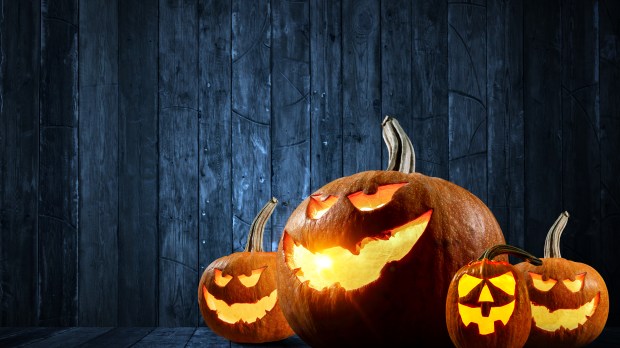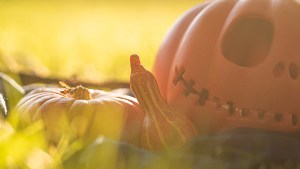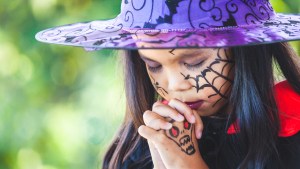As a Catholic mom, I love Halloween. The costumes, the candy, and the spooky decorations are not just something we allow as a family, but something we embrace.
I did not celebrate this holiday much growing up. We trick-or-treated when I was little, but we did not live in a walkable neighborhood, which made it difficult. Later, some negativity about Halloween cropped up in our local Catholic community, partially as a reaction to a strong New Age presence in our city. My family attended an All Saints party at church for a few years, but then we gradually stopped celebrating altogether, beyond observing the Holy Day.
It took having children of my own to reawaken an interest in Halloween.
The town where we live has a sweet, family-friendly parade on Halloween night, a tradition that has been going on for more than 60 years. A friend invited me to attend when our kids were toddlers, and soon it became our annual tradition as well.
In addition to wearing secular costumes for Halloween, my children have always dressed up as saints for All Saints Day, first with our playgroup of Catholic moms and then as part of a special Holy Day Mass at their Catholic school. This has made for many exhausting years of staying up late eating candy on Halloween night, only to wake up and get dressed in another elaborate costume for an early Mass.
In their early years, my little ones dressed up as princesses or superheroes, but as they got older they also reveled in the scariness of Halloween. My dramatic daughter delights in dressing as something spooky and making our house look haunted. Similarly, for years my son always wanted to be a saint who died a dramatically violent death — St. Sebastian with arrows in his chest or St. Vitus who was skinned!
At first I felt a little guilty about this contrast and wondered if we were celebrating in the “correct” Catholic way. But as our traditions developed over the years, they began to strike me as more and more fitting. While there may be disagreement on how Halloween should be observed, it is clear that it has both pagan and Catholic roots. I remember my mom explaining to me as a child how the Catholic church “baptized” many pagan customs, such as decorating eggs and evergreen trees, and incorporated them into liturgical life.
As I reflected on both the natural and the liturgical year, I began to see how the pageantry of Halloween highlights the contrast between earth and heaven, between good and evil, and between our inevitable death and the hope of eternal life.
It brings to mind an oft-quoted line of G.K. Chesterton, “Fairy tales do not tell children that dragons exist. Children already know that dragons exist. Fairy tales tell children the dragons can be killed.”
And that is what we celebrate. Dressing up as ghouls or skeletons is a way to process what we already know exists — fear, evil, and death. For a night we focus on our earthly lot. Then the next morning we get up to celebrate that this is not where it ends. Fear can be overcome with hope, evil with goodness, death with eternal life.
For the whole next month we pray for the poor souls, those who have lived and died before us but not yet finished their journey. As the month of November ends, we begin to focus on the four last things – death, judgment, heaven, and hell. And finally, at the end of the Church year, we celebrate the Feast of Christ the King. He is at the end of it all and is the answer to the dread and the mortality we all experience.
So this year again we will put out our spiderwebs and skeletons, evoking the scariness of this world and the fear of passing from it. We will go out and walk around in the darkness. And then we will rise the next morning knowing that Christ has dominion over it all.



